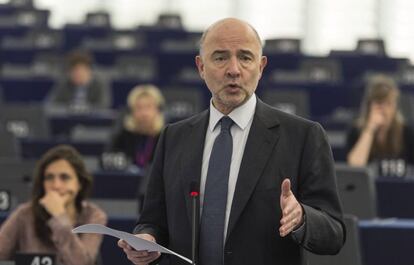Brussels asks Spain for €8 billion in new spending cuts
EU postpones sanctions for deficit target miss but demands more adjustments between now and 2017

Brussels has postponed sanctions against Spain for its continuous deficit target misses until after the country holds general elections on June 26.
But that is where the good news ends.
On Wednesday, the European Commission (EC) also demanded budget cuts of over €8 billion between this year and the next.
The European executive wants Spain to bring down its deficit to 3.7% of GDP in 2016 and 2.5% in 2017. The Spanish deficit at the end of 2015 was 5.1% of economic output, far above its target. The country has the second-largest deficit in the entire EU.
A delayed decision
EC President Jean-Claude Juncker has defeated the voices that were asking for a strict application of fiscal regulations and immediate sanctions against Spain for overshooting its target again.
Instead, the EC will wait until after Spaniards go back to the polls following the inconclusive election of December 20. According to a EU source, a decision will be made “in the first few days of July.”
The Commission is asking for an ambitious but realistic effort
Pierre Moscovici, EU Economy Commissioner
“This is neither the political nor the economic moment to take this measure [sanctions],” said Economy Commissioner Pierre Moscovici on Wednesday.
The fine could be as steep as €2 billion, according to some European sources, although the Spanish government hopes that the final figure will be much lower, if not zero altogether.
Asked whether Spain has leeway to lower taxes, as acting prime minister Mariano Rajoy has promised to do, EC Vice-President Valdis Dombrovskis said that Spain “can take whatever tax decisions it wants, as long as it meets the deficit [target].”
In a recent interview with the Financial Times, Rajoy had said that if he wins the elections he will lower taxes again.
The fourth time
This is the fourth time since the Great Recession began that Brussels gives Spain an extra year to bring the deficit down.
Sign up for our newsletter
EL PAÍS English Edition has launched a weekly newsletter. Sign up today to receive a selection of our best stories in your inbox every Saturday morning. For full details about how to subscribe, click here.
In exchange, it is asking for a new round of adjustments on top of the unpopular budget cuts that the Spanish government has already enacted.
“The Commission is asking for an ambitious but realistic effort,” said Moscovici, adding that the cuts will be made “at a fast pace.”
Brussels wants to see structural cuts worth 0.25% of GDP in 2016 and another 0.5% of GDP in 2017. The Commission also wants Madrid to crack down on regional governments, which are chiefly responsible for Spain’s steep deviation from deficit targets.
Meanwhile, the public debt has now exceeded 100% of GDP, a situation unseen since 1909.
Spain and Portugal
The remarks were part of the presentation of country-specific recommendations for the Spring 2016 European Economic Package. This set of measures are meant to guide member states’ actions over the next 12 to 18 months.
“As regards Portugal and Spain, the Commission recommends to the Council to recommend a durable correction of the excessive deficit in 2016 and 2017 respectively, by taking the necessary structural measures and by using all windfall gains for deficit and debt reduction,” says the EC in its recommendations.
English version by Susana Urra.
Tu suscripción se está usando en otro dispositivo
¿Quieres añadir otro usuario a tu suscripción?
Si continúas leyendo en este dispositivo, no se podrá leer en el otro.
FlechaTu suscripción se está usando en otro dispositivo y solo puedes acceder a EL PAÍS desde un dispositivo a la vez.
Si quieres compartir tu cuenta, cambia tu suscripción a la modalidad Premium, así podrás añadir otro usuario. Cada uno accederá con su propia cuenta de email, lo que os permitirá personalizar vuestra experiencia en EL PAÍS.
¿Tienes una suscripción de empresa? Accede aquí para contratar más cuentas.
En el caso de no saber quién está usando tu cuenta, te recomendamos cambiar tu contraseña aquí.
Si decides continuar compartiendo tu cuenta, este mensaje se mostrará en tu dispositivo y en el de la otra persona que está usando tu cuenta de forma indefinida, afectando a tu experiencia de lectura. Puedes consultar aquí los términos y condiciones de la suscripción digital.









































